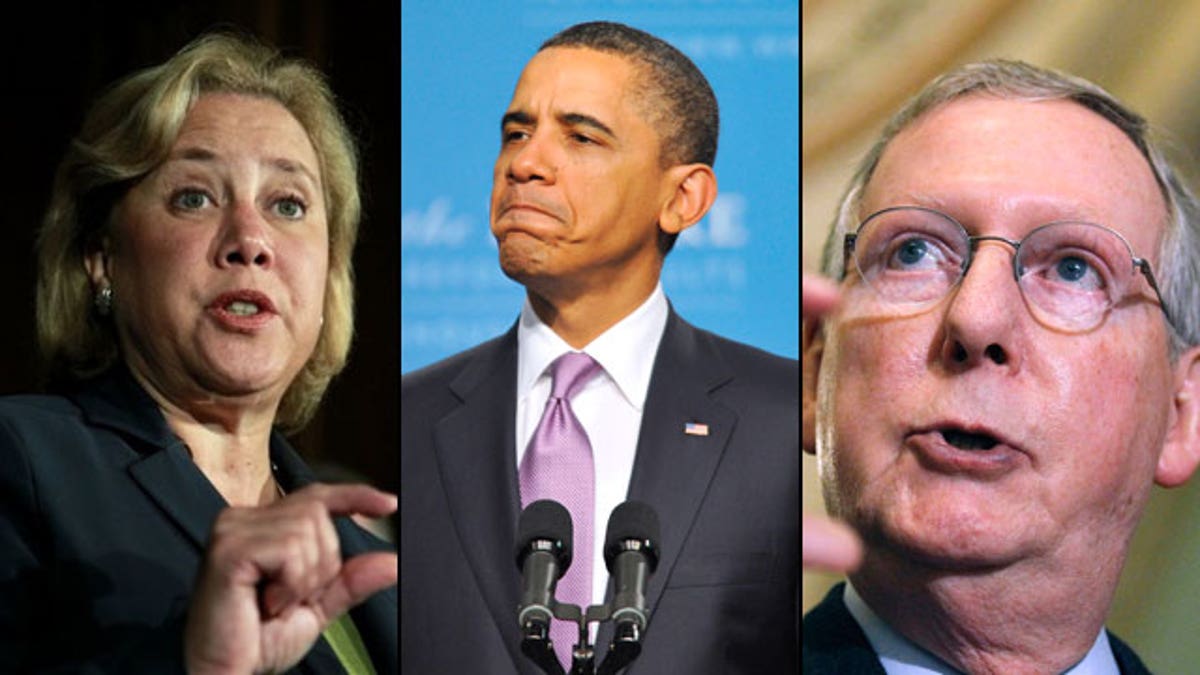
Sen. Mary Landrieu, D-La. and Senate Republican leader Mitch McConnell are questioning the Obama administration's energy policies and arguing more should be done to develop domestic sources of energy. (AP)
With energy prices rising in part because of turmoil in the Middle East, lawmakers from both parties are questioning the Obama administration's energy policies and arguing more should be done to develop domestic sources of energy.
"I don't think the president's position on oil and gas is as strong as it should be,” said Democratic Sen. Mary Landrieu of Louisiana, where the oil industry plays a large role in the local economy. “Oil and gas is an important industry in the United States today and it will be in the next decades.”
Many in the administration emphasize alternative forms of energy and some, including the president, have openly talked of the need for higher prices on oil and coal to make alternatives such as wind and solar more price-competitive.
Landrieu and most other lawmakers embrace an "all of the above" strategy, saying all forms of energy should be developed. But both Republicans and Democrats note that it will be decades before the need for oil is significantly reduced, so why not produce more of it? The U.S. use 20 million barrels a day but produces only seven million.
After the massive BP oil spill in the Gulf last April, the administration imposed a moratorium on new permits. That was lifted in October, but until this week, no permits had been issued for deepwater drilling.
“I think what should be unmistakably clear is that the policy that we have in this administration is to support oil and gas drilling, both in the shallow waters as well as in the deep waters, and we just want to make sure that it's done right and in an environmentally safe way,” Interior Secretary Ken Salazar said in a Senate Natural Resources Committee hearing this week.
The Interior Department granted a single deepwater permit on Monday, saying before it could continue issuing permits, it had to certify that new wells have containment capacity in the case of another blowout. Though he would not lay out a timeline, Salazar told senators that the department will move forward with permits for deepwater drilling. He also offered reassurances about future petroleum exploration and production.
"In terms of the Gulf of Mexico production, we continue to have a robust production, as we did this last year and we expect to continue to have a robust production in 2011 as well,” Salazar said.
But Sen. Landrieu noted that before the blowout, the government's own experts said production in the Gulf of Mexico this year would be 1.77 million barrels a day. Now that projection has dropped to 1.39 million.
In 2012, the government originally projected production of 1.82 million barrels a day, but now sees a decline to 1.14 million barrels a day.
That is a drop of 680,000 barrels a day, which equals about half of the global exports from Libya. Unrest in Libya has led to concerns over a disruption in that country’s exports, creating fears that are driving oil prices higher.
At the same time, some Republican senators charge the Environmental Protection Agency is out to kill the coal industry.
More than half the nation's electricity comes from coal, and Senate Minority Leader McConnell, R-Ky., accuses the EPA of sitting on mine applications, noting 79 are now in bureaucratic limbo.
"The EPA has turned the permitting process into a back-door means of shutting down coal mines by sitting on permits indefinitely, thus removing any regulatory certainty," he said.
So McConnell, Sen. Rand Paul, R-Ky., and others introduced a bill to force the EPA to use or lose its veto over mine applications within 60 days.
























